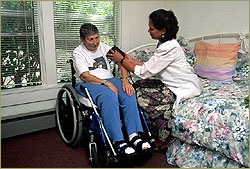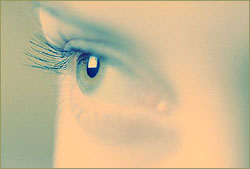 |
 |
|  Philip Kitcher
Philip Kitcher
|
Manipulating Genes: How Much is Too Much?
The era of molecular medicine now dawning has a lot of people worried about the moral and ethical implications of genetic testing, therapy, and enhancement. One person who has given a lot of thought to these matters is Dr. Philip Kitcher, a Professor of Philosophy at Columbia University and the author of The Lives to Come: The Genetic Revolution and Human Possibilities (Simon & Schuster, 1996). Here, in a frank and thoughtful interview with NOVA Online, Kitcher speaks his mind on some of the controversial issues now under discussion, including discrimination, abortion, and lack of privacy, all of which may increase in novel and potentially disturbing ways with the new science.
NOVA: Are you excited or disturbed by the implications of molecular medicine, or a little bit of both?
Kitcher: I'd have to say a little bit of both. And I think my attitude since writing The Lives to Come has been to worry more rather than less.
NOVA: Why is that?
Kitcher: Really two reasons: First, some of the things that were pointed out as being necessary a decade ago are still not in place, and very many hard problems now await us. I think the political mood of the country is so against instituting the kinds of needed programs that it's likely that a large number of people will be hurt by this rather than benefited by it. The second thing is that it seems to me that more and more the private sector has entered this realm and is likely to develop scientific research in the direction of profits, which is not necessarily going to accord with what is good for people either in this country or more broadly around the world.
 "If we can do something successfully with gene therapy to avert progressive memory loss or keep people flexible longer, I don't see why we shouldn't do that," Kitcher says.
"If we can do something successfully with gene therapy to avert progressive memory loss or keep people flexible longer, I don't see why we shouldn't do that," Kitcher says.
|
|
NOVA: Where should we draw the line on the continuum between preventing suffering with gene therapy and improving upon nature with genetic enhancement? That is, once we start where do we stop?
Kitcher: I think there are some things we can do that clearly would improve the quality of life of certain people, and those are a very good idea. If we can do something successfully with gene therapy to avert progressive memory loss or keep people flexible longer, I don't see why we shouldn't do that. Nor, of course, do I see any reason why we shouldn't do what we can to combat diseases by means of gene therapy, if that becomes possible. I know it has its advocates, but at the moment it seems to me that except for really serious, debilitating conditions, it's inadvisable to try anything very ambitious with gene therapy, simply because it's so crude. It may become much more refined in future decades, but at the moment it's very crude.
NOVA: Well, if it does become refined, and we begin to abort lives that doctors or parents perceive as flawed, will we be playing God?
Kitcher: Look, I think the use of Tay-Sachs prenatal testing is a very merciful thing. I thoroughly approve of that. I think things become much more tricky when you talk about issues like cystic fibrosis, chances for heart disease in middle age, conditions like dwarfism, various kinds of blindness and deafness. There I think it's genuinely hard to figure out whether or not you should prevent a birth.
NOVA: What about, hypothetically speaking, if screening were to reveal genes that would predispose a person to, say, obesity or homosexuality or low I.Q.?
|
"It's horrendous to me to envisage a world in which we all have to try to conform to some rather narrow range of features."
|
Kitcher: Well, we know that these are going to be probabilistic things. The case of same-sex preference, for example -- it's not going to be more than a 50 percent propensity. I think that's a desperately sad thing. Obesity comes with certain health risks, and the question then is whether things could be done to help the young child avoid the lack of health.
It's horrendous to me to envisage a world in which we all have to try to conform to some rather narrow range of features. When I wrote a review essay a few years ago for the London Review of Books, the editor gave it a really interesting title. The title was "Tall, Handsome, Straight, and Intelligent." You know, I think it would be dreadful confining human diversity to such very narrow ideals.
NOVA: And yet who wouldn't want to be, say, tall, intelligent, and perfectly healthy who could be?
Kitcher: Why are we so concerned with tallness? Are we concerned with intelligence for its own sake, or are we concerned with intelligence as a means to getting ahead in life? If it's the latter, then of course what we want is children who are more intelligent than other people's children. I think there's nothing wrong with something if it were taking the following attitude: "I want this for my child, and I hope that every other child can have it, too." But the real worry is that there are conditions in which one wants to have the advantage over other people; one wants children who are smarter or more muscular than others rather than wanting intelligence or fit bodies for their own sake.
 Few people would likely disagree that, once we learn how, genetically preventing tragic diseases such as Huntington's chorea would be acceptable, if not prescribed.
Few people would likely disagree that, once we learn how, genetically preventing tragic diseases such as Huntington's chorea would be acceptable, if not prescribed.
|
|
NOVA: Is it ethical to alter the genes of someone who hasn't been born yet and hasn't given his or her consent?
Kitcher: It's not technically possible.
NOVA: I mean when and if it becomes so.
Kitcher: Consider the following possibility: There's a fetus, and we discover through genetic screening that there is an allele at a particular locus correlated with extreme problems. Let's say it's Huntington's disease long repeat, and we have some molecular scissors we could send in and cut that repeat down to size. I don't see any problem with snipping out little bits of genetic material to prevent somebody from developing Huntington's. There's absolutely nothing unethical about doing that. We can be very, very confident that this is something that the child would want, right?
Suppose that a pregnant woman were told that if she ate a certain substance -- let's make it something really benign like bananas, which she would normally eat -- there's a high risk that her child would develop some nasty condition. It seems to me perfectly ethical for her to abstain from eating bananas even though she might normally have made bananas part of her diet.
In both cases I think the underlying moral principal is the same: We are confident that the person-to-be would thank us for doing this.
|  "If we can't find better things to do with biomedical technology than to modify people's eye color, then life will be very good indeed," Kitcher says.
"If we can't find better things to do with biomedical technology than to modify people's eye color, then life will be very good indeed," Kitcher says.
|
NOVA: What about when you get into something trickier, like altering eye color, if that ever became possible?
Kitcher: Eye color isn't tricky at all. If we can't find better things to do with biomedical technology than to modify people's eye color, then life will be very good indeed. If we ever get to that utopian state then we can worry about whether or not that's ethical. For the moment, we've got many, many urgent biomedical problems to deal with, and I think it would be frivolous to do that.
Just as I think it's frivolous to waste medical resources in the affluent world at the moment when there is so much preventable suffering and infectious disease of all kinds in the developing world. That's a theme I've gotten more and more interested in since I wrote the book -- using the new genetic techniques on a more global scale. I think we ought to be looking much more at that.
Continue: A world of benefits
Watch the Program Here |
Our Genetic Future (A Survey)
Manipulating Genes: How Much is Too Much? |
Understanding Heredity
Explore a Stretch of Code |
Nature vs Nurture Revisited
Sequence for Yourself |
Journey into DNA |
Meet the Decoders
Resources |
Update to Program |
Teacher's Guide |
Transcript
Site Map |
Cracking the Code of Life Home
Editor's Picks |
Previous Sites |
Join Us/E-mail |
TV/Web Schedule |
About NOVA
Watch NOVAs online |
Teachers |
Site Map |
Shop |
Search |
To Print
PBS Online |
NOVA Online |
WGBH
© | Updated April 2001
|
|
|